 In her landmark, 75-page decision filed on Friday, U.S. District Court Judge Beryl A. Howell did much more than simply grant a motion filed by the House Judiciary Committee (HJC) to compel the U.S. Department of Justice (DOJ) to provide it with grand jury materials from Special Counsel Robert Mueller's probe that had been previously concealed. In that same order, the court systematically demolished every quasi-legal objection the DOJ and White House have raised in their specious efforts to interfere with an ongoing and lawful impeachment inquiry.
In her landmark, 75-page decision filed on Friday, U.S. District Court Judge Beryl A. Howell did much more than simply grant a motion filed by the House Judiciary Committee (HJC) to compel the U.S. Department of Justice (DOJ) to provide it with grand jury materials from Special Counsel Robert Mueller's probe that had been previously concealed. In that same order, the court systematically demolished every quasi-legal objection the DOJ and White House have raised in their specious efforts to interfere with an ongoing and lawful impeachment inquiry.
The core question raised by HJC's motion was whether the court should order the DOJ to release pertinent grand jury materials in accordance with Rule 6(e) of the Federal Rules of Criminal Procedure. Although grand jury testimony and exhibits are ordinarily kept secret, Rule 6(e) authorizes a court to order the disclosure of such materials "preliminarily to" or "in connection with a judicial proceeding" when there is a "particularized need" for disclosure.
Judge Howell suggested that a House impeachment inquiry, in and of itself, may be considered a "judicial proceeding". She concluded, however, that the court did not have to reach that issue because the HJC was correct in its assertion that its impeachment inquiry was "preliminary to" a judicial proceeding.
In her erudite decision, Howell cited historical practice, the Federalist Papers, the text of the Constitution, and both Supreme Court and binding DC Circuit Court of Appeals precedent. All of these make it abundantly clear: U.S. Senate impeachment trials are "judicial proceedings". Indeed, the DOJ's contrary position is not only at odds with the appellate decision in Haldeman v. Sirica (1974) but also with the DOJ's own legal position in that Watergate-era decision. The DOJ was unable to satisfactorily explain why, under Attorney General William P. Barr, it had changed its previous, long-standing legal position.
The "particularized need" to release the materials arises, in this instance, because Mueller, in deference to the opinions of the DOJ's Office of Legal Counsel (OLC) that a sitting President may not be indicted,* refrained from reaching conclusions about the legality or illegality of the President's conduct. "This," the court observed, "leaves the House as the only federal body that can act on allegations of presidential misconduct." Yet, the court observed, "under the DOJ's reading of Rule 6(e), the Executive Branch would be empowered to wall off any evidence of presidential misconduct from the House by placing that evidence before a grand jury."
The DOJ's contentions were, thus, not simply wrong but untenable. "In carrying out the weighty constitutional duty of determining whether impeachment of the President is warranted," Judge Howell observed at the outset of her opinion, "Congress need not redo the nearly two years of effort spent on the Special Counsel's investigation, nor risk being mislead by witnesses, who may have provided information to the grand jury and the Special Counsel that varies with what they tell HJC."
Had she stopped there, Judge Howell's ruling would be significant. Her demolition of every argument against the validity of the impeachment inquiry that has been presented by the DOJ, by the White House and by some Republican members of Congress, however, was nothing short of breathtaking...
Lawful impeachment inquiry
The court flat out rejected DOJ efforts to question the validity of the impeachment inquiry.
"Article I [of the U.S. Constitution] grants exclusive authority" to the U.S. House of Representatives to establish its own rules with respect to the conduct of an impeachment inquiry. Neither the judiciary "nor the Executive Branch may tell Congress what rules it must adopt," the court observed, quoting relevant case law. The "courts get no vote in how each chamber chooses to run its internal affairs."
The court's reasoning not only eviscerated the DOJ's arguments but also shredded the frivolous contention made by White House Counsel Pat Cipollone, in his October 8 letter that there can be no impeachment inquiry unless or until it has been formally approved via a full vote on the House floor.
Judge Howell demonstrated that Cipollone's letter, which had previously been dismissed by constitutional scholars as "baseless", was factually as well as legally unsound.
There is nothing in the House rules that mandates a floor vote as a precursor to the initiation of an impeachment inquiry. Indeed, historically, impeachment inquiries have usually been initiated after a member introduces an impeachment resolution.
Contrary to a widespread misconception, the impeachment inquiry now underway did not begin when Speaker Nancy Pelosi (D-CA) made a formal "impeachment inquiry" announcement on September 24. It began on January 3, 2019 when a resolution calling for President Trump's impeachment was formally introduced and referred to the HJC for consideration.
On June 6, the HJC issued a report that accompanied a resolution. That resolution recommended that AG Barr be held in contempt of Congress after he failed to comply with a subpoena that sought production of the unredacted Mueller Report and underlying grand jury materials. In that same report, the HJC explained that it was conducting an "investigation into the alleged obstruction of justice, public corruption and other abuses of power by President Donald J. Trump [in order to] consider...whether to approve articles of impeachment."
On June 11, the full House expressly approved that investigation via a 229-191 vote.
On Sept. 24, Speaker Pelosi announced that the full House was "moving forward with an official impeachment inquiry." The Speaker observed that, over the preceding months, the House had been "investigating in our Committees and litigating in the courts so the House can gather all relevant facts and consider whether to...[approve] articles of impeachment."
House Rules govern closed-door depositions
As Judge Howell observed, absent a clear-cut constitutional violation, courts must defer to the rule-making authority that Article I of the U.S. Constitution exclusively confers upon the House of Representatives.
House Rules, as MSNBC's Steve Benen correctly observed, expressly authorize Committees to conduct the investigative phase of an impeachment inquiry via closed-door depositions in which only committee members and their staff are permitted to attend. These rules were utilized when Republicans held the majority in the House in 2015.
During the House Select Committee on Benghazi proceedings, Chairman Trey Gowdy (R-SC) refused to release the transcripts of the behind closed-doors, 9-hour deposition of Hillary Clinton aide, Cheryl Miller. Gowdy also refused to allow the Benghazi Committee's former Chair, Rep. Darrell Issa (R-CA), to attend one of those closed-door depositions because Issa was no longer a member of the Committee.
The fact that the discovery phase of the Benghazi inquiry was conducted behind closed-doors did not mean that Democrats were prevented from taking part in the depositions. Committee members, irrespective of Party, were permitted to attend. Likewise, in this instance, 13 of the 48 Republicans who disruptively barged into a closed-door impeachment inquiry deposition, as part of a farcical protest last week, were already Committee Members who had a right to constructively take part in those depositions. Instead, they chose to take part in a blatantly deceptive publicity stunt.
The court's reasoning makes short work of the argument presented by White House Counsel and several Republican members of Congress that closed-door depositions violate the President's right to due process.
"To the extent the House's role in the impeachment context is to investigate misconduct of the President and to ascertain whether the conduct amounts to an impeachable offense warranting remove from office," Judge Howell observed, "the House performs a function somewhat akin to a grand jury."
Targets of a criminal investigation retain the right to assert certain privileges, such as the 5th Amendment against self-incrimination, when called to testify before a federal grand jury. Ordinarily, however, a potential defendant cannot assert the right to appear with counsel when called to testify before a federal grand jury. Like the deposition/discovery procedures expressly authorized by House rules with respect to an impeachment inquiry, grand jury investigations are secret proceedings in which a target's attorneys have no right to appear or to cross-examine witnesses. Those due process rights ordinarily arise only after the indictment is handed down.
Here, issues concerning the President's right to counsel and right to confront witnesses will arise in conjunction with an impeachment trial in the Senate after the House formally approves Articles of Impeachment.
Public hearings?
For anyone who has ever practiced law, the GOP's process objections are, at best, amusing. The need to take closed-door depositions exists only during the discovery phase of the impeachment inquiry. Once the facts have been ascertained and witnesses have been pinned down by their sworn testimony, the next logical step for those who believe this President has committed impeachable offenses, is to present live testimony and exhibits during public and widely publicized hearings in the HJC.
As recently reported by The Washington Post, that public hearing phase is likely to begin in or around mid-November.
The real target of that second phase will be the American public, whose overwhelming support of impeachment could prove essential to politically convincing a Republican-controlled Senate to vote to convict (and remove the President from office) if compelled by the evidence to do so. That is precisely what transpired during Watergate. In June 1973, prior to public hearings, a meager 19% of all Americans supported impeachment. By August 1974, 1/3 of Republicans and more than 50% of Independents wanted Nixon to be impeached.
In order to achieve that type of dramatic shift, Democrats, as Rep. Jim Hines (D-CT) explained to The Washington Post, have come to understand that it will not be enough to simply present a cold reading of the transcripts of those behind-closed door depositions. The American people must hear live testimony from these same witnesses. When that occurs, GOP complaints about closed-door depositions will be swept into the dustbin of history.
_____
That case involved Trump's motion to quash a grand jury subpoena issued by Manhattan DA Cyrus R. Vance, Jr. Vance seeks, from a third party accounting firm, the financial records of the Trump Organization, LLP. Trump's attorneys, citing the OLC opinions, argued that a sitting President enjoys an "absolute immunity" while in office from all judicial process. They argued that a sitting President may not even be investigated, much less prosecuted, by either federal or state authorities for any crime he may have committed either before or since assuming office and irrespective of whether the crime was committed in conjunction with his official duties. Judge Marrero expressly rejected the efficacy of the OLC opinions, which do not, contrary to popular belief, rise to the level of binding precedents.
The President appealed. During recent oral arguments in that case, the President's position became a reductio ad absurdum. Given the illogic of such a broad and absolute immunity, Trump's attorney was compelled to argue that even local authorities could do nothing if a sitting President were to shoot someone dead on 5th Avenue.
UPDATE 10/28/19: The DOJ filed a motion requesting that Judge Howell stay her decision pending an appeal to the D.C. Circuit Court of Appeal.
Given the content of her decision, it is unlikely that Judge Howell will grant the stay. Following her anticipated denial, it is anticipated that the DOJ will seek a stay from the appellate court.
Additionally, the House will vote later this week "to establish the format for open [impeachment inquiry] hearings," according to a Tweet posted by Rep. Adam Schiff (D-CA). "The American people," Schiff added, "will hear firsthand about the President's misconduct."
UPDATE 10/29/19: A 3-judge panel of the D.C. Circuit Court of Appeal issued a temporary stay, according to The Hill, explaining:
The Hill adds that all three judges were nominated to serve on the Court of Appeal by President Barack Obama.
 Ernest A. Canning is a retired attorney, author, Vietnam Veteran (4th Infantry, Central Highlands 1968) and a Senior Advisor to Veterans For Bernie. He has been a member of the California state bar since 1977. In addition to a juris doctor, he has received both undergraduate and graduate degrees in political science. Follow him on twitter: @cann4ing
Ernest A. Canning is a retired attorney, author, Vietnam Veteran (4th Infantry, Central Highlands 1968) and a Senior Advisor to Veterans For Bernie. He has been a member of the California state bar since 1977. In addition to a juris doctor, he has received both undergraduate and graduate degrees in political science. Follow him on twitter: @cann4ing


 Trump Admin's Endless Waste, Fraud, Abuse on Voting, at DOJ, by DOGE: 'BradCast' 1/20/26
Trump Admin's Endless Waste, Fraud, Abuse on Voting, at DOJ, by DOGE: 'BradCast' 1/20/26 'Green News Report' 1/20/26
'Green News Report' 1/20/26
 Sunday 'Domestic Terrorist' Toons
Sunday 'Domestic Terrorist' Toons 'A Cornered Rat is a Dangerous Rat': Trump Terrorizes Minn., Menaces NATO, World: 'BradCast' 1/15/26
'A Cornered Rat is a Dangerous Rat': Trump Terrorizes Minn., Menaces NATO, World: 'BradCast' 1/15/26 'Green News Report' 1/15/26
'Green News Report' 1/15/26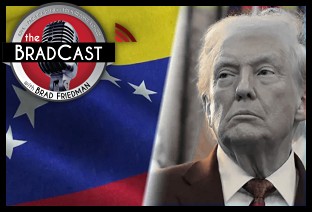 'This Isn't Close to Over': Mad King Trump in Venezuela (and Beyond): 'BradCast' 1/14
'This Isn't Close to Over': Mad King Trump in Venezuela (and Beyond): 'BradCast' 1/14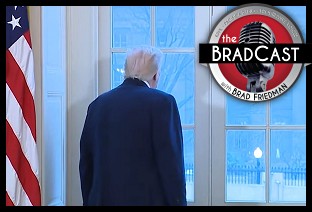 Things Getting Weirder as Trump Keeps Losing: 'BradCast' 1/13/26
Things Getting Weirder as Trump Keeps Losing: 'BradCast' 1/13/26 'Green News Report' 1/13/26
'Green News Report' 1/13/26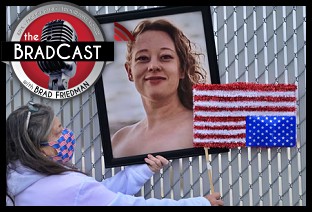 After ICE Murder in MN, Local Cops Disown Fed Policing Practices: 'BradCast' 1/12/26
After ICE Murder in MN, Local Cops Disown Fed Policing Practices: 'BradCast' 1/12/26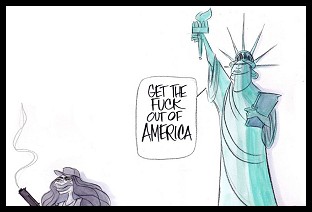 Sunday 'Ice Age' Toons
Sunday 'Ice Age' Toons 'Green News Report' 1/8/26
'Green News Report' 1/8/26 Trump to Congress, Climate, U.N., Rule of Law: DROP DEAD - 'BradCast' 1/8/26
Trump to Congress, Climate, U.N., Rule of Law: DROP DEAD - 'BradCast' 1/8/26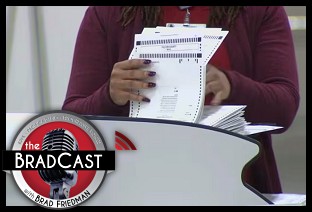 'Nonsense': Trumpers Claim 315k Fraudulent GA Votes in 2020: 'BradCast' 1/7/26
'Nonsense': Trumpers Claim 315k Fraudulent GA Votes in 2020: 'BradCast' 1/7/26 Jack Smith Testimony on Trump J6 Crimes, DOJ Weaponization: 'BradCast' 1/6/26
Jack Smith Testimony on Trump J6 Crimes, DOJ Weaponization: 'BradCast' 1/6/26 Trump War on Venez. is About Ego, Power, 'Alien Enemies Act': 'BradCast' 1/5/26
Trump War on Venez. is About Ego, Power, 'Alien Enemies Act': 'BradCast' 1/5/26 Have a Holly Jolly Somehow
Have a Holly Jolly Somehow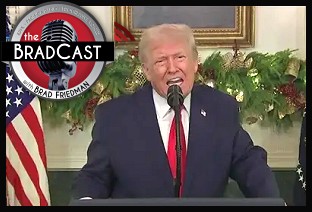 Old Man Shouts at People from WH for 20 Minutes: 'BradCast' 12/18/25
Old Man Shouts at People from WH for 20 Minutes: 'BradCast' 12/18/25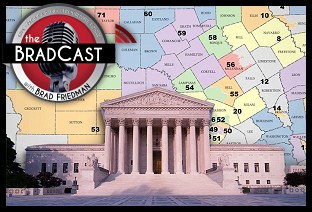 SCOTUS' How-To on Gerrymandering on 'Eve' of Election Year: BradCast' 12/17/25
SCOTUS' How-To on Gerrymandering on 'Eve' of Election Year: BradCast' 12/17/25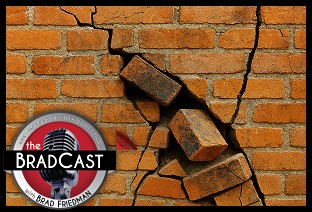 Bricks in the Wall: 'BradCast' 12/16/25
Bricks in the Wall: 'BradCast' 12/16/25
 VA GOP VOTER REG FRAUDSTER OFF HOOK
VA GOP VOTER REG FRAUDSTER OFF HOOK Criminal GOP Voter Registration Fraud Probe Expanding in VA
Criminal GOP Voter Registration Fraud Probe Expanding in VA DOJ PROBE SOUGHT AFTER VA ARREST
DOJ PROBE SOUGHT AFTER VA ARREST Arrest in VA: GOP Voter Reg Scandal Widens
Arrest in VA: GOP Voter Reg Scandal Widens ALL TOGETHER: ROVE, SPROUL, KOCHS, RNC
ALL TOGETHER: ROVE, SPROUL, KOCHS, RNC LATimes: RNC's 'Fired' Sproul Working for Repubs in 'as Many as 30 States'
LATimes: RNC's 'Fired' Sproul Working for Repubs in 'as Many as 30 States' 'Fired' Sproul Group 'Cloned', Still Working for Republicans in At Least 10 States
'Fired' Sproul Group 'Cloned', Still Working for Republicans in At Least 10 States FINALLY: FOX ON GOP REG FRAUD SCANDAL
FINALLY: FOX ON GOP REG FRAUD SCANDAL COLORADO FOLLOWS FLORIDA WITH GOP CRIMINAL INVESTIGATION
COLORADO FOLLOWS FLORIDA WITH GOP CRIMINAL INVESTIGATION CRIMINAL PROBE LAUNCHED INTO GOP VOTER REGISTRATION FRAUD SCANDAL IN FL
CRIMINAL PROBE LAUNCHED INTO GOP VOTER REGISTRATION FRAUD SCANDAL IN FL Brad Breaks PA Photo ID & GOP Registration Fraud Scandal News on Hartmann TV
Brad Breaks PA Photo ID & GOP Registration Fraud Scandal News on Hartmann TV  CAUGHT ON TAPE: COORDINATED NATIONWIDE GOP VOTER REG SCAM
CAUGHT ON TAPE: COORDINATED NATIONWIDE GOP VOTER REG SCAM CRIMINAL ELECTION FRAUD COMPLAINT FILED AGAINST GOP 'FRAUD' FIRM
CRIMINAL ELECTION FRAUD COMPLAINT FILED AGAINST GOP 'FRAUD' FIRM RICK SCOTT GETS ROLLED IN GOP REGISTRATION FRAUD SCANDAL
RICK SCOTT GETS ROLLED IN GOP REGISTRATION FRAUD SCANDAL VIDEO: Brad Breaks GOP Reg Fraud Scandal on Hartmann TV
VIDEO: Brad Breaks GOP Reg Fraud Scandal on Hartmann TV RNC FIRES NATIONAL VOTER REGISTRATION FIRM FOR FRAUD
RNC FIRES NATIONAL VOTER REGISTRATION FIRM FOR FRAUD EXCLUSIVE: Intvw w/ FL Official Who First Discovered GOP Reg Fraud
EXCLUSIVE: Intvw w/ FL Official Who First Discovered GOP Reg Fraud GOP REGISTRATION FRAUD FOUND IN FL
GOP REGISTRATION FRAUD FOUND IN FL

































